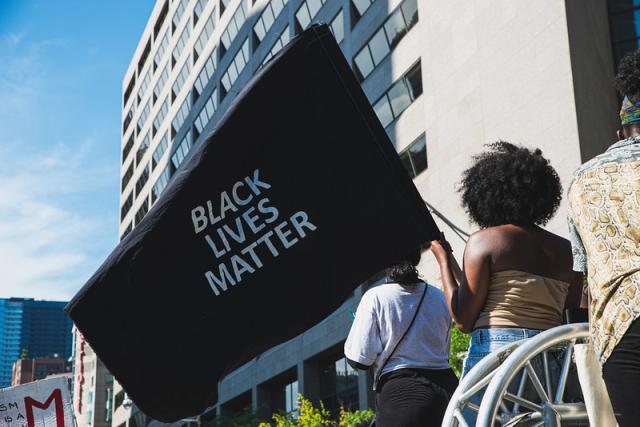When we fail to recognize that our acceptance of inequality is a form of racism, we fail to live up to our basic Christian commitments.

Some people have questioned the phrase, Black Lives Matter with the retort, “all lives matter.” But that misses the point.
The need is to proclaim what is not apparent in the way our society works. The way our society works reflects a reality that White people’s lives matter the most. That White people are the norm. We might feel inclined to defend the principles of our democracy and our justice system, which lift up fairness and equality to all. Well, except maybe those who fall under the application of the Indian Act. But it isn’t enough to look at the intent: full analysis requires looking at the outcomes too.
To mention just a couple of statistics: 27 percent of Black children live in low-income situations, compared to 14 percent for the rest of the population. And incarceration rates are significantly higher, with Black people making up 8.6 percent of prison inmates while they are only 3 percent of the overall population.
The statistical imbalances are also there for Indigenous Canadians. Our journey towards reconciliation in Canada reflects a different – but in some ways similar – need to address a colonial past that has left many biases built into our systems of government, of justice, of education… and yes, even of church. A whole set of systems that have benefited White people, whether we knew it or not, has at the same time, disadvantaged others.
What does this mean for us as Christians?
Isn’t it obvious? We follow Jesus, who saw through the false distinctions of the social norms of his time, and lifted up the essential humanity – and godliness – of everyone.
We profess to a faith based on compassion, on the simple direction that we are to love others as ourselves.
When we fail to recognize that our acceptance of inequality in our society, of inequities in our society, is a form of racism, we fail to live up to our basic Christian commitments.
These days the social isolation requirements of the pandemic have most of us living very insular lives. We hardly see anyone beyond our own households. Hard as this is for everyone, the reality is that the impacts of COVID-19 are not evenly distributed across all racial groups. Nothing in the pandemic response singled out racial differences, but the differences are there in the results. Although the general statistical reporting on the pandemic in Canada has not included a race based component, analysis of the Toronto neighbourhoods most affected by COVID-19 shows that these are also the neighbourhoods with a greater proportion of Black residents. It’s a good example of how pre-existing social inequities provide the foundation for even greater disparities in times of crisis.
Many people may feel overwhelmed by the weight of all this, and be wondering what they can offer that would make a difference. This isn’t a time when everyone needs to have all the answers. It may be that the best approach is to begin by listening, by caring, by hearing what is asked for. If you haven’t yet seen the worship service led by the Black Clergy Network of our church recently, I recommend checking it out on YouTube as a good place to start your listening.
We also need to act, in big ways and small, but for those of us whose life experiences have not included being the target of anti-Black racism or any form of racism, we need to bring an element of humility into our impulse to name the solutions.
A colleague shared a video that I thought offered that reminder quite graciously, which you can find here, in case you want to watch it too.
Peace and grace to you.
Nora
— Nora Sanders is General Secretary of The United Church of Canada.
This message was originally sent to subscribers to the General Secretary's letter, "Note from Nora." Subscribe here.